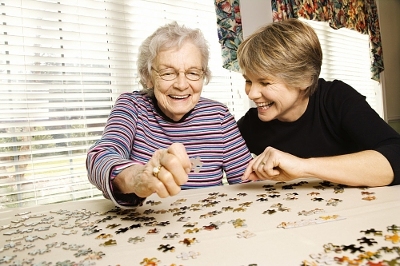
Caregivers of individuals living with Alzheimer’s and all other dementia should follow guidelines from the Centers for Disease Control (CDC), and consider the following tips:
- For people living with dementia, increased confusion is often the first symptom of any illness. If a person living with dementia shows rapidly increased confusion, contact your health care provider for advice.
- People living with dementia may need extra and/or written reminders and support to remember important hygienic practices from one day to the next.
- Consider placing signs in the bathroom and elsewhere to remind people with dementia to wash their hands with soap for 20 seconds.
- Demonstrate thorough hand-washing.
- Alcohol-based hand sanitizer with at least 60% alcohol can be a quick alternative to hand-washing if the person with dementia cannot get to a sink or wash his/her hands easily.
- Ask your pharmacist or doctor about filling prescriptions for a greater number of days to reduce trips to the pharmacy.
- Think ahead and make alternative plans for the person with dementia should adult day care, respite, etc. be modified or cancelled in response to COVID-19.
- Think ahead and make alternative plans for care management if the primary caregiver should become sick.
It can be difficult to explain to a person with dementia why they should wash their hands more frequently, or why you are trying to avoid touching them. You will need to make the decision whether it is possible for you to sleep separately or stay six feet (three steps) away from each other. If it is not possible – try to not worry or feel guilty about this. You are doing your best under very difficult circumstances. If the person you care for is reassured by your presence and your touch, then that itself is very important.
During this time, while you are at home, make sure you have everything you need for the foreseeable future. Organise an online grocery delivery or ask friends and family to do this for you. Try and arrange repeat prescriptions to be delivered or again, to be picked up by family and friends. If this is not possible, check local websites like Facebook, Patch, Next Door (or equivalent; you might have to register) for local support groups that have started operating to help people in self-isolation. These deliveries can be left at the front door for you. If you have a Neighborhood Watch team – contact them and let them know to look out for you and your family member.
As day centers close and support groups stop meeting, it is imperative that you find other ways to give yourself some respite. The best thing you can do during this time is try to both stay entertained and distracted. If possible, set up different areas around your home so that you can move from activity to activity: watch favourite films and musicals in the living room. Listen to the radio in the kitchen. Do jigsaw puzzles at the table. If you can, take walks around the garden.
Ask friends and relatives to bring you films, puzzles, music, games – anything you think the person with dementia might like to do. Again, they can leave these outside the front door for you.
Staying physically active during this time will help to keep you mentally and physically well. If you feel well enough, and have access to countryside where you will not come into close contact with other people, then try and get outside for a walk. This can become part of a new routine for you, as well as give you both something to talk about when you get back home.
If you have a garden, go outside when possible. Finding things to do outside or simply sitting in whatever sunshine we may get over the next few weeks will help. Fresh air and green space will help lift the spirits and also provide some stimulation. If you can, plant up a few plant pots with seeds or flowers that can be placed near the windows. If you have a garden shed, there may be some projects in there you can try – like making a bird feeder.
Missing friends and family
If you have other people you usually see or who visit you, make a point of keeping in contact. Set up a regular phone call or video conversation with them, so that you are staying connected to the world outside and still checking in on the people you care about.
Staying healthy
Pay attention to flu or pneumonia-like symptoms in yourself and others and report them to a medical professional immediately.
Follow current guidance and instruction from the CDC regarding COVID-19. Tips to keep yourself and your loved ones healthy include:
- Avoid close contact with people who are sick.
- Avoid touching your eyes, nose and mouth.
- Stay home when you are sick; work from home.
- Cover your cough or sneeze with a tissue, then throw the tissue in the trash.
- Clean and disinfect frequently touched objects and surfaces using a regular household cleaning spray or wipe.
- Wash your hands often with soap and water for at least 20 seconds, especially after going to the bathroom; before eating; and after blowing your nose, coughing or sneezing.
- If soap and water are not readily available, use an alcohol-based hand sanitizer with at least 60% alcohol.
- Always wash hands with soap and water if your hands are visibly dirty.